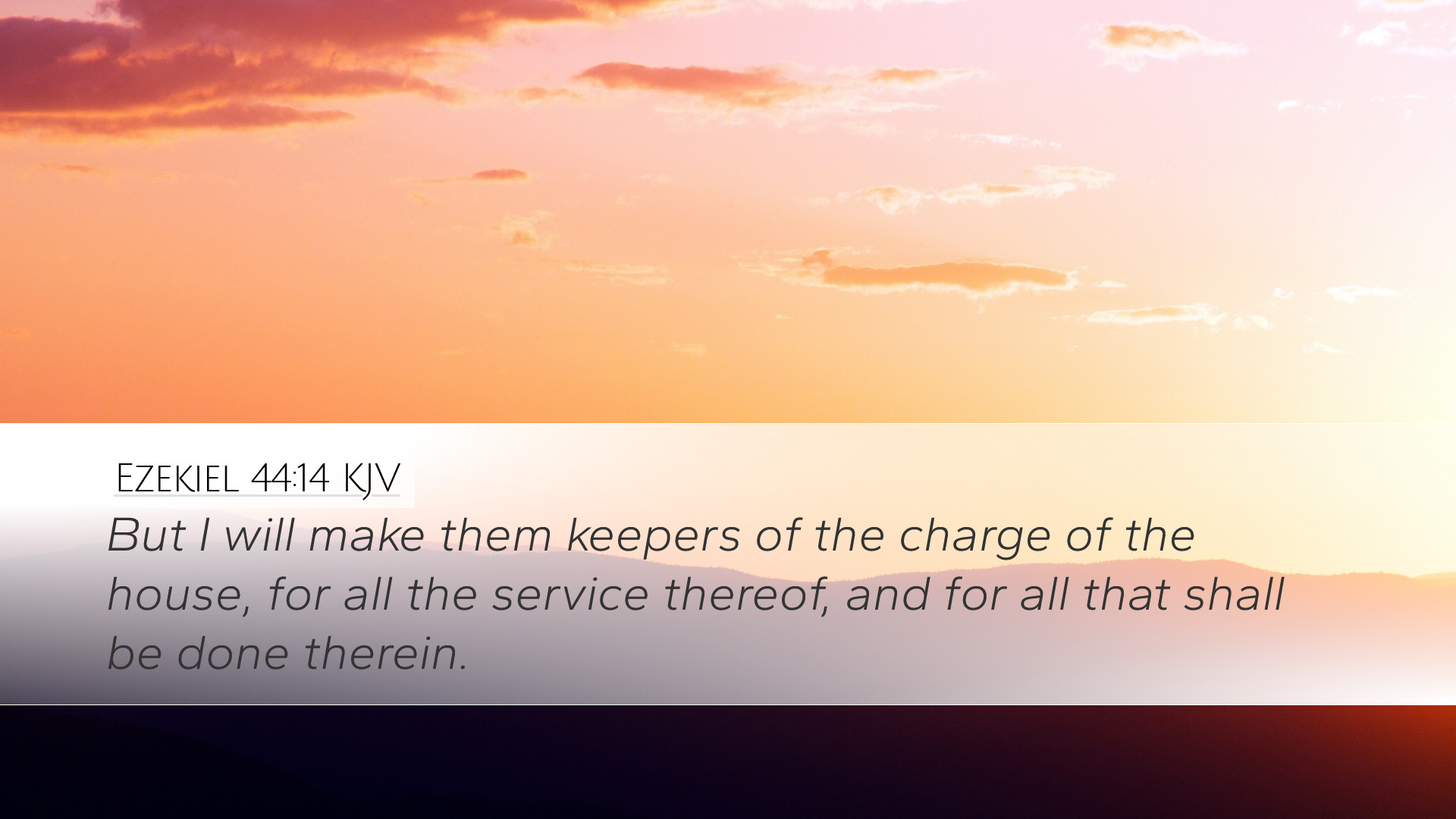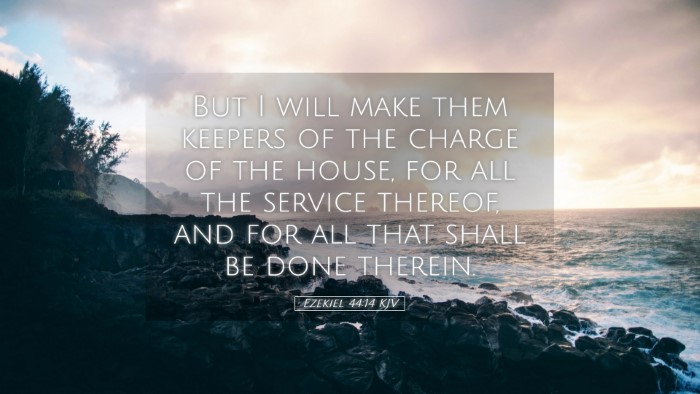Ezekiel 44:14 Commentary
Verse Text: "Yet I will make them keepers of the charge of the house, for all the service thereof, and for all that shall be done therein." (Ezekiel 44:14, KJV)
Introduction
This verse, situated within the prophecies of Ezekiel, provides profound insights into the roles and responsibilities designated to certain groups within the temple's operation. The broader context of Ezekiel's vision denotes the restoration of Israel and their worship practices after exile. This commentary synthesizes insights from various public domain sources, including those of Matthew Henry, Albert Barnes, and Adam Clarke, enriching our understanding of the responsibilities outlined for the Levites in the temple.
Contextual Background
Ezekiel prophesied during a time of significant turmoil—exile, destruction, and a loss of identity for the Israelites. The temple, once a symbol of God's presence, had been defiled. Ezekiel speaks of a future restoration where proper worship and service to God would be reinstated.
In this specific chapter, the roles of the priests and Levites are clarified, denoting a shift from the previous corrupt practices to a new covenantal faithfulness in serving God through His ordained structure.
The Role of the Levites
This verse highlights that the Levites, despite their past failures, were not entirely dismissed from service. Instead, they are confirmed in their roles as "keepers of the charge of the house." This redemption of their service indicates God’s grace and commitment to restoring His covenant people.
- Matthew Henry: Emphasizes the grace shown to the Levites despite their previous idolatry. Their role is vital as guardians of the temple, indicating that God resumes His dwelling among His people.
- Albert Barnes: Notes the significance of the Levites in the context of service, stating that their duties relate to all areas of temple operation, thereby maintaining a holistic approach to worship and service.
- Adam Clarke: Provides a detailed exposition on the Levites' prior defilement and God's subsequent reinstatement of them as a demonstration of divine mercy, reiterating the importance of their service in the restored temple.
Theme of Restoration
The overarching theme of restoration in Ezekiel is prevalent, portraying that God's judgment is never without the promise of redemption. The reinstatement of Levites is symbolic of Israel's own potential for renewal. This function as "keepers" not only reinstates their role but also invokes a sense of responsibility to uphold holiness.
Matthew Henry reflects that this restoration signifies not just service, but a call to purity and dedication in their tasks. The Levites, tasked with maintaining the temple, represent a renewed covenant where holiness is paramount.
The Importance of Service in Worship
Service in the house of the Lord underlines a foundational aspect of worship—it is not merely about ritual but functional commitment. The term “keepers of the charge” carries implications of watchfulness, guardianship, and an active role in the sacred space.
Albert Barnes notes that such service is indispensable for divine worship, enhancing the congregational experience, and representing the people before God.
- Role of the Keepers: Their responsibilities included oversight of the sacrificial system, teaching the law, and guarding the holiness of the sanctuary.
- Commitment to Excellence: This verse emphasizes that believers are called to approach worship with seriousness and intent, fulfilling their duties with reverence.
Application for Today's Believers
The implications of Ezekiel 44:14 extend beyond the Levites to all believers today. The New Testament teaches that all followers of Christ are called to be 'priests' (1 Peter 2:9). As such, believers are invited to participate in the sacred service of God, highlighting the continuity of sacred duties.
Adam Clarke asserts that this functional aspect of the church today pertains to the faithful stewardship of God’s resources and the active participation in community and worship. Service ought to reflect a heart aligned with God’s purpose.
Conclusion
Ezekiel 44:14 encapsulates the restored role of the Levites within the new temple framework, serving as both a historical reminder and a timeless template for worship and service. It emphasizes themes of redemption, responsibility, and the call to uphold holiness in one’s community and personal life. As believers, the commitment to serve in God’s house remains a vital aspect of faithful living.
Reflection Questions
- In what ways do you reflect the role of a 'keeper' in your spiritual community?
- How can you cultivate holiness in your service to God and others?
- What does this verse teach you about the nature of God's grace and restoration?


